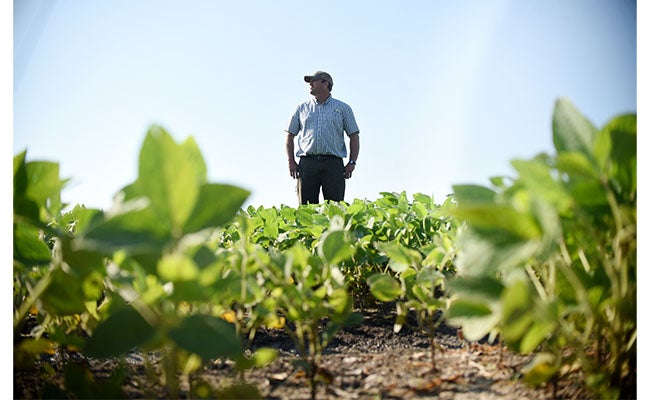Weather, trade war threaten local soybean crop
Published 12:01 am Thursday, May 16, 2019

- Concordia Parish soybean farmer Barrett Arthur stands in a field of soybeans. (File Photo | The Natchez Democrat)
VIDALIA — Concordia Parish soybean farmers are keeping their eyes on trade negotiations with China as much as they are watching the water levels of the Mississippi River.
Both could have an impact on their crops.
“The issue of the weather, the rain seep water, the river and some flooding in some areas will put some (crops in danger),” said Dennis Burns, LSU Ag Agent for Tensas, Catahoula and Concordia parishes.
Soybeans are the dominant crop planted in the three parishes, Burns said with a total of approximately 286,446 acres of soybeans planted, included 124,285 acres in Concordia Parish alone.
Burns said all of the soybeans produced in the three parishes go down the Mississippi River to elevators before they are shipped overseas and 30% of the United States’ total soybean crop production goes to China.
Earlier this week, The Associated Press reported that China announced tariffs of “$60 billion on American exports — retaliation for President Donald Trump’s latest penalties on Chinese goods…”
That is bad news for the local soybean farmers, Burns said.
Concordia Parish soybean farmer Barrett Arthur said he has 12,000 acres of soybeans planted this year in Concordia Parish.
“I wish he had picked something else to negotiate,” Arthur said of Trump’s tariffs with China, “but I definitely understand what he’s doing and if it doesn’t get straight in the next few months … The longer it goes on, the more serious it is going to get.”
Burns said he could not put a price tag on how the tariffs might affect local soybean farmers.
“The price of soybeans has gone down some in the last few days, and they were up a little (Tuesday) …,” Burns said. “It is hard to guess. We have weather scares and that sort of things. It is going to cost them more, I guess (to ship to China). And some of that, I’m not exactly sure the economics of how exactly it all works. If it goes to China … it will cost more for the Chinese to buy so the Chinese will go, say, to South America, or some other country in the world that produces soybeans.”
Last year a similar situation affected the soybean farmers with tariffs on China and the United States government paid out subsidies to soybean farmers, Arthur said. Nonetheless, Arthur said he put some of his crops in storage last year, and he is prepared to put another 200,000 bushels in storage again this year.
“That’s all the storage I’ve got,” Arthur said. “What we can’t sell — what we can’t hold in our grain facility, obviously, we will have to go on and sell, but we plan on filling our grain facility on up. That’s our backup plan, but it isn’t a good one.”
Arthur said he could not speculate on potential buyers to replace China.
“Each month that it goes on the more serious that it gets,” Arthur said. “It definitely needs to be addressed by August. That’s when we start harvesting. While we support the negotiations, we hope to have it addressed by August. I hope it will be addressed by August.”
Burns said other opportunities could emerge.
“We will have to hold on to ours and try to sell them other places or fill in voids, maybe South America cannot provide their whole needs and maybe we can,” Burns said. “We will have some sales, but it won’t be the normal sales.”
Burns said that if soybean farmers have a bad year, it would have a ripple effect on the rest of the community.
“The money turns over in the parish,” Burns said. “The better the price, the better the crop, the more money is going to be turned over. Everybody is connected not just the farmers, but the grocery store, everybody, is connected with it.”





